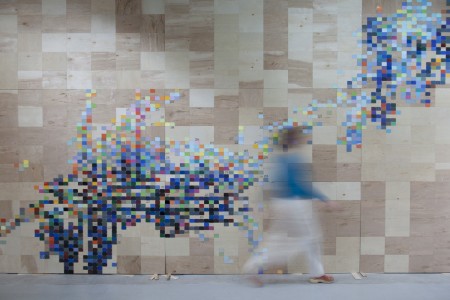What if you could see exactly where you've been...
/If we can make the invisible paths of where we travel, where we walk, where we go visually compelling does it change or reinforce behavior?

Numbers are abstract concepts, but our brains recognize pattern intuitively. I've been working toward a future where everything about us can be instantly measured and significantly added to my daily regimen to test a patterned vocabulary and grammar for self-tracking.
I often use myself as a test subject and gather my own data for installations and hand-built work. The pieces use underlying algorithms – as I experiment with ways to use memory, color, sense and data to build a patterned language that substitute as portraits of ourselves.
My focus in the past year has been tracking movement and travel by walking and photo gathering through a city. I’m using an accelerometer (a fitbit) which tracks distance and steps, an opensource application on a smart phone, Openpath.cc which gathers time and GPS coordinates and will enable residents to privately participate in a group project. I often supplement with time-lapse photography using a little camera I wear around my neck to document the visual experience.
What I know from 3 years now, tracking steps, calories, weight, DNA, sleep, gps location, daily mood, food consumed, words spoken, writing and time-online, is that a habit of measuring adds weight and a sense of being in the world. It has been an unusual opportunity to gain insight to an unseen part of myself. Data is increasingly simple and easy to collect using gadgets or sensors that point toward a future where complete self-surveillance will be the norm. As time and events slip by unnoticed, it can give just a bit more observation and mindfulness to what is actually happening as we move thru the day.
Every time I look at future scenarios of data tracking – it takes on a hugely sinister theme. Intense fear, worry, anxiety, loss of privacy to government agencies or global brand advertisers is the typical response. At times I think it is inevitable. Every bit of data about us will be known. Should we worry, or can we personally begin to know more and self-experiment. Rather than just be fearful, we might grab even more data and play with it, test it out, experiment with how it feels and build something we desire and embrace.
So, in anticipation of a time where sensors are seamlessly embedded in our clothes and in tiny bits we swallow with vitamins. Location coordinates are gathered from phones and recordings of what we see, say and hear are invisibly captured, I've been collecting data to experiment and test ways of converting data into abstract patterns which can communicate encoded meaning about us.
I’m especially fascinated with the sense of watching the unnoticed part of ourselves. The subliminal, the unseen, the part others see but we don’t see or even remember. The chance to see the OTHER you, the person that operates unconsciously in the world without direct control.
Does mindfulness and observation add a little fuel to your psyche? Does self-reflection using real data calm you down, sooth you, help you sleep, rev you up, give you encouragement, change your relationships, scare you, bring you something you never considered? Maybe. But experimentation is the only way to know.




